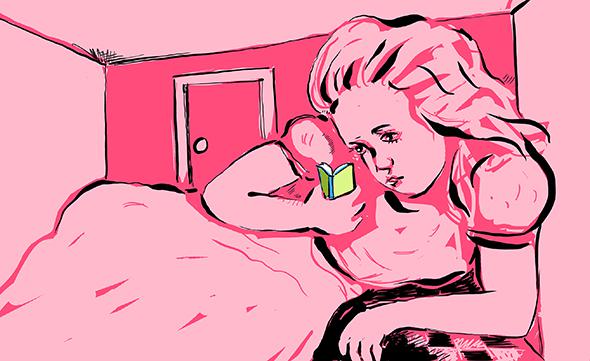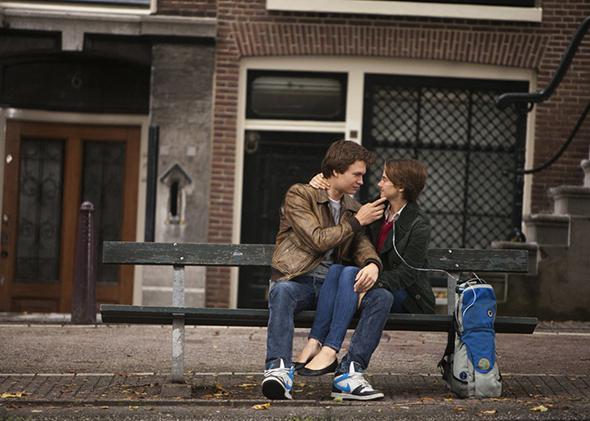Age Range of Those Who Read Young Adult Books
Against YA
Read whatever you lot desire. But you should experience embarrassed when what you're reading was written for children.

Analogy past Liana Finck.
As The Fault in Our Stars barrels into theaters this weekend most guaranteed to become a blockbuster, information technology can exist hard to recollect that once upon a time, an adult might accept felt embarrassed to exist caught reading the novel that inspired information technology. Not because it is bad—it isn't—but because it was written for teenagers.
The once-unseemly notion that it's acceptable for non-young adults to read young-adult fiction is at present conventional wisdom. Today, grown-ups brandish their copies of teen novels with pride. There are endless lists of YA novels that adults should read, an "I read YA" entrada for grown-upwardly YA fans, and confessional posts by adult YA addicts. But reading YA doesn't make for much of a confession these days: A 2012 survey past a market research firm establish that 55 per centum of these books are bought by people older than xviii. (The definition of YA is increasingly fuzzy, but information technology generally refers to books written for 12- to 17-year-olds. Meanwhile, the cultural definition of "young adult" now stretches practically to age 30, which may take something to do with this whole phenomenon.)
The largest group of buyers in that survey—accounting for a whopping 28 per centum of all YA sales—are between ages 30 and 44. That'south my demographic, which might be why I wasn't surprised to hear this news. I'm surrounded by YA-loving adults, both in real life and online. Today's YA, we are constantly reminded, is worldly and adult-worthy. That has kept me bashful well-nigh expressing my own fuddy-duddy opinion: Adultsshould experience embarrassed about reading literature written for children.
Let's fix aside the transparently trashy stuff like Divergent and Twilight, which no one defends equally serious literature. I'm talking about the genre the publishing industry calls "realistic fiction." These are the books, like The Error in Our Stars , that are about real teens doing existent things, and that rise and fall not only on the strength of their stories but, theoretically, on the quality of their writing. These are the books that could plausibly be said to be replacing literary fiction in the lives of their adult readers. And that'south a shame.
The Fault in Our Stars is the well-nigh obvious juggernaut, just it'due south not the just YA book for which adults (and Hollywood) have gone crazy. Coming to theaters later this summer is If I Stay, based on Gayle Forman's recent novel about a teenage girl in a coma. And DreamWorks just announced it bought the rights to Eleanor & Park, Rainbow Rowell'due south outcast romance that Kirkus Reviews said "will obsess teen and adult readers akin." Before these there were the bestsellers (and movies) The Perks of Being a Wallflower and Information technology's Kind of a Funny Story.
Adult fans of these books declare confidently that YA is more than sophisticated than e'er. This kind of thing is hard to quantify, though I will say that my ain life as a YA reader mode back in the early 1990s was hardly wanting for either satisfaction or sophistication. Books like The Westing Game and Constrict Everlasting provided some of the most intense reading experiences of my life. I accept no urge to go dorsum and re-read them, only those books helped turn me into the reader I am today. It's just that today, I am a different reader.
I'one thousand a reader who did not weep, contra every article ever written about the volume, when I read The Mistake in Our Stars. I idea, Hmm, that's a nicely written book for 13-yr-olds. If I'k being honest, it likewise left me saying "Oh, brother" out loud more than once. Does this make me heartless? Or does it make me a grown-up? This is, after all, a book that features a devastatingly handsome teen boy who says things similar "I'chiliad in love with you, and I'm not in the business of denying myself the simple pleasure of maxim truthful things" to his girlfriend, whom he then tenderly deflowers on a European vacation he arranged.
That will sound harsh to these characters' legions of ardent fans. But even the myriad defenders of YA fiction admit that the enjoyment of reading this stuff has to do with escapism, instant gratification, and nostalgia. Every bit the writer Jen Doll, who used to have a column called "YA for Grownups," put information technology in an essay last yr, "At its centre, YA aims to be pleasurable."

Photo past James Bridges/Twentieth Century Fox Film Corporation
But the very means that YA is pleasurable are at odds with the way that adult fiction is pleasurable. There'south of grade no shame in writing virtually teenagers; think Shakespeare or the Brontë sisters or Megan Abbott. But crucially, YA books present the teenage perspective in a fundamentally uncritical way. Information technology'south non only that YA readers are asked to immerse themselves in a character's emotional life—that'due south the play tricks of so much great fiction—but that they are asked to abandon the mature insights into that perspective that they (supposedly) have acquired as adults. When chapter later on chapter in Eleanor & Park ends with some version of "He'd never get enough of her," the reader seems to be expected to swoon. But how can a grown-upwardly, even one happy to exist reminded of the shivers of beginning love, non also roll her eyes?
Most chiefly, these books consistently indulge in the kind of endings that teenagers desire to run into, but which adult readers ought to reject as far too uncomplicated. YA endings are uniformly satisfying, whether that satisfaction comes through weeping or cheering. These endings are allegorical of the fact that the emotional and moral ambiguity of developed fiction—of the existent earth—is nowhere in evidence in YA fiction. These endings are for readers who prefer things to be wrapped upwardly neatly, our heroes married or dead or happily grasping hands, looking to the future. But wanting endings like this is no more aggressive than only wanting to read books with "likable" protagonists.
Young man grown-ups, at the gamble of sounding snobbish and joyless and old, nosotros are amend than this. I know, I know: Live and let read. Far be it from me to disrupt the "everyone should simply read/lookout/mind to any they like" ethos of our era. At that place's room for pleasure, escapism, juicy plots, and satisfying endings on the shelves of the serious reader. And if people are reading Eleanor & Park instead of watching Nashville or reading detective novels, so exist it, I suppose. But if they are substituting maudlin teen dramas for the complexity of great developed literature, then they are missing something.
The heroine of The Fault in Our Stars finds messy, unresolved stories unacceptably annoying. Her favorite volume ends mid-sentence, which drives her to endeavor and learn the story's "real" ending from its author: "I know it's a very literary determination and everything and probably part of the reason I dear the book so much, simply there is something to recommend a story that ends." True enough, and appropriate to the character, who finds the doubtfulness of her own virtually future maddening. But mature readers likewise find satisfaction of a more intricate kind in stories that derange and discomfit, and in reading almost people with whom they tin't sympathise at all. A few months agone I read the very literary novel Submergence, which ends with a decease so shattering information technology's been rattling effectually in my head ever since. (If it'south really a death! Adult novels often embrace ambiguity.)*But it likewise offers and then much more: Weird facts, astonishing sentences, deeply unfamiliar (to me) characters, and big ideas nearly time and space and science and honey. I've besides gotten purer plot-based highs recently from books past Charles Dickens and Edith Wharton, whose historic period and canonhood have not stopped them from feeling fresh, truthful, and surprising. Life is so short, and the list of truly great books for adults is so long.
I do not begrudge young adults themselves their renaissance of fiction. I want teenagers and ambitious pre-teens to have as many wonderful books to read as possible, including books about their ain lives. But I think, when I was a immature adult, beingness drastic to earn my way into the adult stacks; I wouldn't accept wanted to live in a world where all the adults were camped out in mine. There'south a special reward in that feeling of stretching yourself beyond the YA marking, alike to the excitement of graduating out of the kiddie puddle and the rest of the padded trappings of babyhood: Information technology'southward the thrill of growing up. Only the YA and "new developed" blast may mean fewer teens aspire to grown-up reading, because the grown-ups they know are reading their books. When I call up about what I learned most dearest, relationships, sex, trauma, happiness, and all the rest—y'all know, life—from the extracurricular reading I did in loftier school, I think of John Updike and Alice Munro and other authors whose work has simply become richer to me every bit I take grown older, and which never makes me roll my eyes.
Simply don't have my word for it. Listen to Shailene Woodley, the 22-year-old star of this weekend's big YA-based film. "Last year, when I made Fault, I could even so understand with boyhood," she told New York mag this week, explaining why she is finished making teenage movies. "But I'thou not a immature developed anymore—I'thou a woman."
Update, July 8, 2014: This post has been updated to clarify that the cease of the novelSubmergence, similar the end of many adult novels, is ambiguous.
jacksontreadevent77.blogspot.com
Source: https://slate.com/culture/2014/06/against-ya-adults-should-be-embarrassed-to-read-childrens-books.html
0 Response to "Age Range of Those Who Read Young Adult Books"
Post a Comment